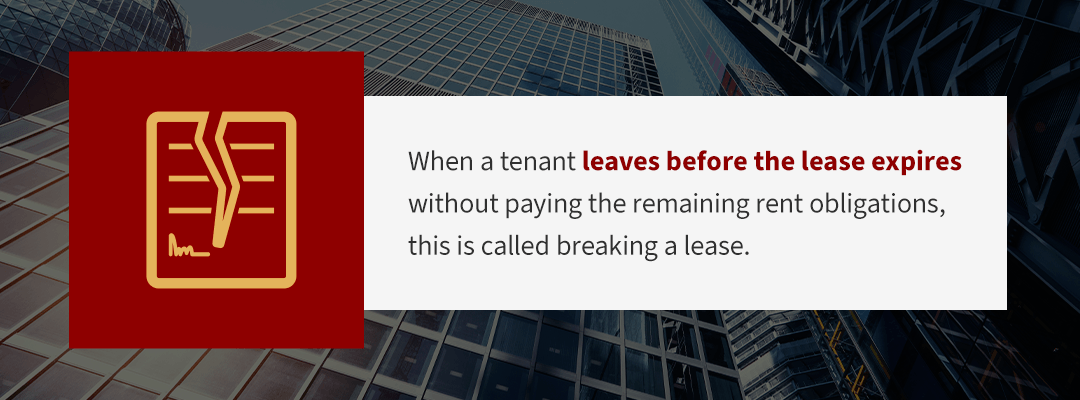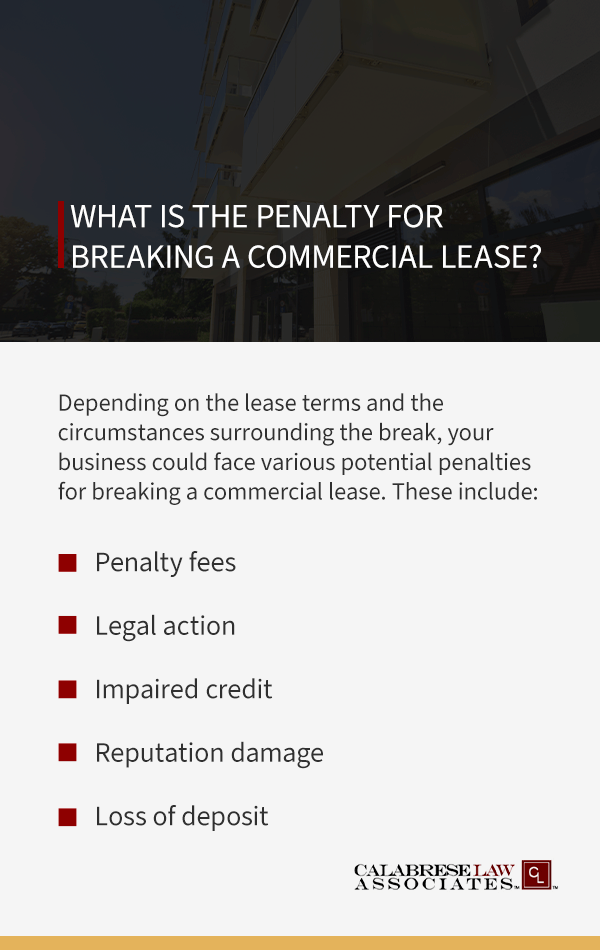A commercial lease is a binding commitment between landlord and tenant that should benefit both parties. If your business rents property and the lease no longer serves your interests, you may want to get out before the full duration passes. Leaving a lease early is possible and sometimes advantageous, but the legal implications can be complex.
This guide will help you understand whether exiting early makes sense for you and how to get out of a commercial lease if it does.
What Does Breaking a Commercial Lease Mean?
Every lease has a set duration after which it expires or is renewed. When a tenant leaves before the lease expires without paying the remaining rent obligations, this is called breaking a lease. Breaking a lease usually results in legal consequences, including financial penalties.
However, tenants can exit a lease early with lesser or no penalties when they do so based on a clause in their lease or other sufficient legal justification. Leaving early with legal justification is not breaking the lease in the technical sense, though people sometimes apply this phrase to any situation where a tenant leaves the lease early.
When May I Leave a Commercial Lease?
In several situations, the tenant has a legal justification to get out of a lease. These can be based on the lease terms or laws that supersede them. Legal justifications to get out of a lease include:
- Any reason for early exit mentioned in your lease’s termination clause.
- A bailout clause allowing tenants to end the lease if sales are low.
- A co-tenancy clause allowing termination if occupancy drops or a designated co-tenant leaves.
- Bankruptcy, when the tenant’s business can no longer afford their rental obligations.
- A material breach of lease terms by the landlord.
- A permitted transfer assigning the lease from the original tenant to another entity.
- A subletting arrangement when the lease provides for this or all parties agree.
- Mutual consent, often when the building is in a popular area and the landlord can quickly find a new tenant at a higher rate.
- Mutual agreement to a deed of surrender releasing both parties from all lease obligations.
When Should I Break a Commercial Lease?
If you want to break your lease without a specific legal justification, you can do so only by accepting penalties and other consequences. Sometimes, even leaving a lease with legal justification, such as a termination clause, will involve penalties. Nonetheless, there are situations where it is beneficial to exit a lease despite the consequences. It could make sense to get out of your commercial lease if:
- Your business is scaling and needs more space than the building can offer.
- Your business is downsizing, and paying for the extra space is no longer justifiable.
- Your business participates in a merger or acquisition that makes this building redundant.
- Your landlord is negligent of their duties, or the relationship is deteriorating.
Depending on the lease terms and the circumstances surrounding the break, your business could face various potential penalties for breaking a commercial lease. These include:
- Penalty fees: The amount due may be specified in the termination clause or assessed by a court. The principle is to leave the landlord in a financial position no worse than the position they would be in if you had completed the lease. Along with a termination fee, you may need to reimburse some or all the rent for the remainder of the lease, advertising costs to find a new tenant, and occasionally cleanup costs or legal expenses.
- Legal action: Since a lease is a binding contract, breaching this agreement can lead to a lawsuit from the landlord. They may sue to recover income and reimburse other costs. By seeking professional legal advice, you can minimize the risk of a lawsuit and prepare yourself to handle one if it arises.
- Impaired credit: If there is a lawsuit and the court rules in favor of your landlord, this can impact your business’s credit score. A damaged credit score may hinder your business from securing a new lease or lending money.
- Reputation damage: Landlords often contact one another for references when conducting due diligence on a prospective tenant. A tenant who breaks their lease without proper cause may find future landlords unwilling to accommodate them.
- Loss of deposit: Your business may forfeit its security deposit when breaking a lease, even if you leave the property in good condition. Consult a real estate attorney to determine whether this is a risk in your case and for help recovering your deposit if possible.
Remember that these are only potential consequences. If you want to exit your lease, you can minimize these risks by taking a strategic legal approach.
10 Tips to Get out of a Commercial Lease
If you want to leave a commercial lease early, your chosen approach makes all the difference. These 10 tips will help you understand your options and how to handle this process to avoid or minimize the negative consequences.
1. Include a Termination Clause
If you are reading this before entering a new lease, be sure to negotiate an early termination clause with your landlord before signing. This is the best way to provide yourself a way out in advance.
If you’re already in a lease you want to exit, your landlord may be willing to amend your lease terms to include an early termination clause that’s fair to both parties. Early termination clauses should specify valid conditions for invoking the clause, minimum notice requirements, and costs.
2. Communicate With Your Landlord
Like you, your landlord will likely prefer a negotiated solution over litigation, provided the negotiated terms are reasonable. Reach out to them with prompt and honest communication. They may be willing to work with you, especially if your reasons for wanting to leave the lease are beyond your control, such as a decline in revenue.
The sooner you communicate, the more time you and your landlord have to find a mutually beneficial solution.
3. Get Legal Advice
Finding the best way out of your commercial lease is a complex task. An experienced real estate attorney who knows commercial lease law in your state can guide you through every step of this process, including:
- Understanding the provisions in your lease.
- Counseling you on your options and their legal implications.
- Recommending the most advantageous way to leave your lease.
- Negotiating with your landlord.
- Drafting legal documents required to exit your lease.
- Representing you in court if necessary.
4. Review Your Insurance
Some business insurance policies include coverage for costs you incur when leaving your lease in certain circumstances. Examine your policy or speak to your carrier to check whether you can claim any costs in your situation. If you can, this will make it easier for you to move forward.
5. Identify a Breach
If your landlord has committed a material breach of your lease, your business may be able to claim that they have broken the agreement, and you are free to walk away without paying rent for the remaining months.
A material breach is a serious violation that impacts the tenant, like failing to address a burst pipe. It means the landlord has failed to fulfill their duties in a way that deprives the tenant of an essential benefit they have a right to expect based on their lease. A real estate attorney can help you identify whether a breach is material before you take steps to exit your lease.
Your landlord may dispute your claim that they committed a breach or that it was material and demand that your business continue to pay rent. In that case, contact an experienced attorney to represent you in court.
6. Invoke a Clause
Often, the simplest path out of a lease is to take advantage of a provision within it. Many commercial leases include exit clauses that permit you to leave early under certain conditions. Such clauses include early termination clauses, bailout clauses, and co-tenancy clauses.
Be careful to observe all the clause’s requirements, such as the minimum notice period and your financial obligations to your landlord. A real estate attorney can help you understand the clause’s terms and approach your landlord to invoke it.
7. Assign Your Lease
An alternative to breaking your lease is assigning it. Lease assignment means you find a new tenant to replace you and arrange for them to rent the property for the rest of your lease period.
Assigning a lease is only possible if your landlord consents. They should give you a “license to assign,” a document certifying their consent.
The advantage of this approach is that if your landlord agrees, you often get to move out with no penalties and leave the new tenant to pay the rent. The downside is that you may be liable for the new tenant’s acts and omissions until the end of your lease period if they fail to pay or damage the property. That’s why offering a quality tenant you trust to replace you is essential.
8. Sublet the Property
Depending on your lease terms and your landlord’s preferences, you may not be able to assign your lease. However, your landlord may allow you to sublet the property instead. Subletting is similar to assignment in that you leave the premises, and a new tenant moves in.
Like assignment, subletting may be a penalty-free alternative to breaking your lease if your landlord consents. However, there are some important differences:
- Subletting involves creating a secondary contract between you and the sublessee. Assignment involves the new tenant replacing you on the original lease.
- Subletting still requires you to pay rent to your landlord, though you aim to recover the cost by collecting rent from the sublessee. Assignment transfers the immediate responsibility of paying rent to the new tenant.
- Subletting involves more direct responsibility. You will probably remain your landlord’s first point of contact for any concerns about the premises or the sublessee’s actions. Assignment usually allows you to set aside all your immediate responsibilities unless the new tenant breaches the lease terms and you need to step in.
9. Surrender Your Lease
If your lease lacks an early termination clause, you can try to leave it by negotiating a deed of surrender with your landlord. This formal agreement releases you from all your lease obligations and liabilities.
To secure it, you must likely compensate your landlord for at least some of their potential lost income. Sometimes, you may need to pay more than 100% of the remaining rent your landlord would have received. Proposing to pay your landlord a lump sum toward remaining rent obligations in exchange for a deed of surrender is sometimes called a lease buyout.
A real estate attorney can help you negotiate a deed of surrender that is fair to you and confirm you are free of future liabilities. Because of the high potential costs of this approach, they may also help you identify more affordable alternatives.
10. File Bankruptcy
If your business can no longer afford to meet its financial obligations to the landlord, you could consider filing bankruptcy. Bankruptcy relieves your company of all its financial obligations under the lease, including future rent payments. However, it also has serious drawbacks, including:
- Bankruptcy is a black mark against your company’s credit history.
- If there is a lease guarantor, they will have to fulfill your company’s lease obligations.
- Customers and vendors may be reluctant to do business with a bankrupt company.
- Bankruptcy comes with regulatory responsibilities and costs.
Why Trust Calabrese Law Associates for Commercial Lease Law
Calabrese Law Associates is an award-winning law firm serving the Greater Boston area. Customer reviews and testimonials show our team’s expertise, proficiency, and professionalism. With over five decades of collective legal experience, our dedicated Massachusetts real estate law team is skilled in every aspect of real estate law, including commercial lease law, property law, litigation, and related fields.
We handle legal issues at all phases — before, during and after litigation — and we present cases at state and federal levels. This experience positions us to analyze commercial lease law issues in light of Massachusetts real estate contract law, potential litigation, and other legal considerations. From drafting and reviewing leases to representing tenants in court, we provide specialized legal insights at every stage of entering and exiting a lease.
Contact Calabrese Law Associates for Legal Support
If your business has a commercial property lease that no longer serves its interests, Calabrese Law Associates can advise you on the best legal way out.
Our experienced, award-winning Massachusetts real estate law team will examine your lease, recommend a legal path forward, and represent you in litigation if necessary. We commit to being a trusted partner to our clients, attentive to your needs and responsive to your questions. With Calabrese Law Associates, you can count on industry-leading expertise and first-rate service at a reasonable cost.
Contact us for legal assistance and experience freedom for your business to move on.
Attorney Advertising. Prior results do not guarantee a similar outcome.
This publication and its contents are not to be construed as legal advice nor a recommendation to you as to how to proceed. Please consult with a local licensed attorney directly before taking any action that could have legal consequences. This publication and its content do not create an attorney-client relationship and are being provided for general informational purposes only.







